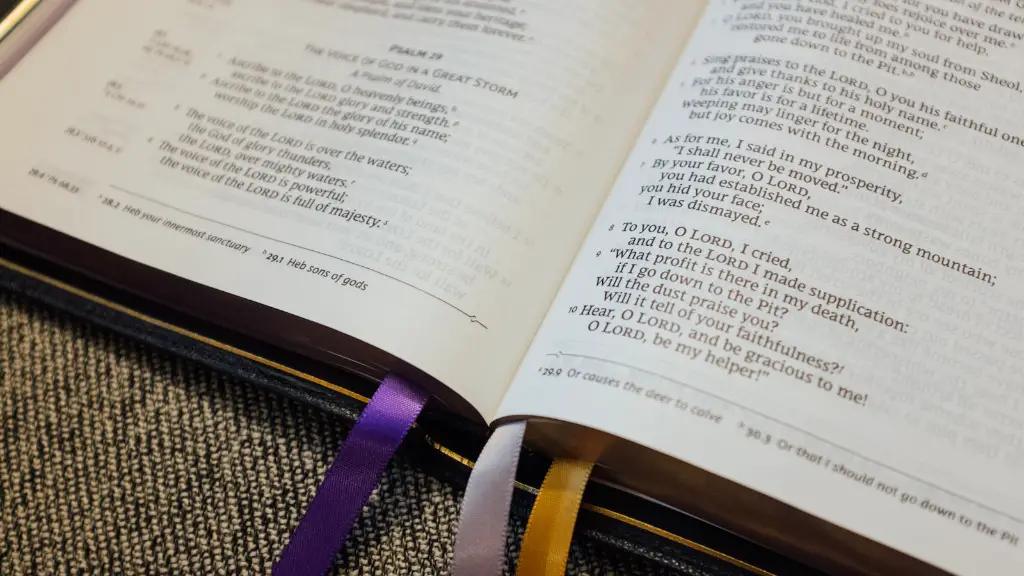What Are the Books Missing From the Bible?
Are there books missing from the Bible? The Christian Bible today contains 66 books, 39 in the Old Testament and 27 in the New Testament, which makes it one of the longest religious literature texts in the world. This raises the question of whether there are books missing from the Bible, and if so, why were they excluded?
Historically, there were numerous books and religious texts in existence, most notably those written by various authors in antiquity. These ranged from narratives such as the stories of Adam and Eve, to narratives of Jewish prophets, to biographies of Jesus and his disciples. Some were included in the Old Testament, while others were kept in other references and not included. This has left many people curious as to why some books were chosen to be included in the Bible, while others were left out.
The simple answer is that the Bible is selective. It is not an encyclopaedia, but rather a collection of books written by different authors over centuries in order to spread religious messages. It was then divided into the canonical books, which became known as the Bible. The process of deciding which books would be accepted as canonical and canonized was lengthy and complex. The church councils of the time, such as the Synod of Hippo and the Council of Carthage, relied on the opinions of theologians and church fathers to determine which books would be included in the Bible.
It’s important to remember that these books were not excluded because their messages were considered bad or heretical. Rather, they were considered to not be reliable enough to be part of the official canon. This is why some books and texts, such as the Apocrypha, are still read and discussed today, even though they are not considered canonical.
However, even though these books are no longer considered part of the official Bible, they still have some significance. Scholars often use these books and other religious texts to gain insight into history, theology, and the evolution of religious thought and beliefs. Thus, the books missing from the Bible still serve a valuable and important purpose, despite not being included in the official canon.
What are the Books of the Apocrypha?
The books of the Apocrypha are a collection of ancient Hebrew and Greek manuscripts that were written during the Second Temple period (circa 530 BCE – 70 CE). These manuscripts were not included in the Protestant Biblical canon, and were excluded primarily due to their lack of archaeological evidence. As such, they are often referred to as the “lost books” or “hidden books” of the Bible.
The Apocrypha includes several books such as the Ezra-Nehemiah, Tobit, Judith, Ecclesiasticus, Wisdom of Solomon, and the additions to Esther and Daniel. In addition to these books, the Apocrypha also includes some pseudepigrapha, which are works that claim to have been written by Biblical figures like Adam and Noah, but which are most likely not authentic.
Although the books of the Apocrypha are not considered canonical, they are still important for several reasons. They provide insight into the beliefs and practices of the Second Temple period and serve as a reminder of the diversity of early Christian thought. In addition, these books are still read and respected by many people today, and serve to enrich our understanding of the Bible and our faith.
What Are the Books of the Gnostics?
The books of the Gnostics are an ancient collection of additional texts written by the Gnostic movement, typically in the second century CE. The word “Gnosticism” comes from the Greek word gnosis, which means “knowledge.” These texts provide a unique insight into early Christian thought and beliefs, and were rejected by the early church for their divergent views on God and Jesus.
The Gnostics believed that God existed in multiple persons and that each person had a particular role to play in God’s plan. They also believed that salvation came from gaining knowledge (gnosis) of God, rather than from following strict rules or rituals. They saw Jesus primarily as a teacher and moral guide, rather than as a divine incarnation of God.
The Gnostic texts provide an important insight into early Christian thought and beliefs, and many of the books are still read and respected today. The most well known of these books is probably the Gospel of Thomas, in which Jesus is quoted as saying, “Whoever discovers the interpretation of these sayings will not taste death.” The books of the Gnostics have been invaluable in providing insight into early Christian history.
What Are the Books of the Dead Sea Scrolls?
The Dead Sea Scrolls are a collection of ancient scrolls discovered in the 1940s in a series of Judaic sites in the Judean Desert. The documents consist of manuscripts in Hebrew, Aramaic, and Greek, and are widely held to be the earliest surviving evidence of Jewish and Christian scriptures. Among the documents are copies of portions of the Second Temple Bible, including books of the Hebrew Bible, as well as many non-canonical texts.
The books of the Dead Sea Scrolls are important because they shed light on the diverse beliefs and practices of the Jewish people at the time. In addition, they provide insight into the development of modern Judaism and Christianity, since they demonstrate a wide range of approaches to understanding scripture and salvation. These texts also provide an invaluable insight into life in the Second Temple Period, as well as an interesting window into the evolution of religious thought.
What Are the Books of the Apocalyptic Literature?
Apocalyptic literature is a genre of literature that is focused on the apocalyptic themes and imagery found in the Bible. This literature includes Jewish writings from the period between 200 BCE and 200CE such as the Book of Daniel and the Book of Enoch, as well as Christian writings from the same period, including the Book of Revelation. These works are characterized by intense descriptions of end-times events, often featuring a divine intervention of some kind.
The books of apocalyptic literature are important because they provide an insight into how ancient cultures and religious traditions viewed the future. This type of literature was also used to encourage faith and offer hope to those facing times of difficulty, as they emphasized the importance of living an upright life in order to be rewarded in the afterlife.
What Are the Books of the Nag Hammadi Library?
The Nag Hammadi Library is a collection of ancient Gnostic texts and Deuterocanonical works that were discovered in the 1940s near the town of Nag Hammadi in Egypt. The texts include narratives about Jesus and early Christian beliefs, as well as philosophical works that provide an important insight into the diverse beliefs of the Gnostics.
The books of the Nag Hammadi Library are important because they provide a window into the beliefs of the Gnostics, which were largely rejected by the early church. In addition, they shed light on the wide range of beliefs held by different religious and cultural movements in antiquity, and help to provide a deeper understanding of religion and culture in the ancient world.
Conclusion
The books missing from the Bible are important because they provide insight into the history, theology, and evolution of religious thought and beliefs. They also remind us of the diversity of ancient beliefs and serve to enrich our understanding of the Bible and our faith. Although these books are no longer considered part of the official Bible, they still have a role to play in our understanding of religious history.




